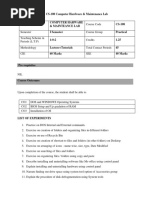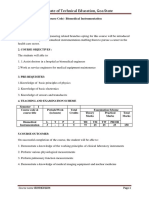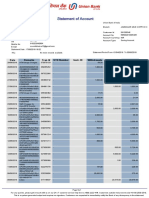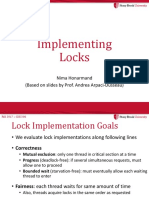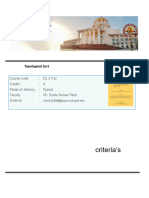Ipe 307
Ipe 307
Uploaded by
32anikkumarpaulCopyright:
Available Formats
Ipe 307
Ipe 307
Uploaded by
32anikkumarpaulOriginal Title
Copyright
Available Formats
Share this document
Did you find this document useful?
Is this content inappropriate?
Copyright:
Available Formats
Ipe 307
Ipe 307
Uploaded by
32anikkumarpaulCopyright:
Available Formats
Department of Industrial and Production Engineering (IPE) COURSE OUTLINE
Bangladesh University of Engineering and Technology Course No. IPE 307
Level 3, Term-I
Credit (Contact) Hours: 4 Credits
(4 hrs/wk)
Description of Course IPE 307
Section A: General Information
1. Course Title Operations Research
2. Type of Course Core Course
3. Offered to Department of Industrial and Production Engineering (IPEE)
4. Pre-requisite Course(s) None
Section B: Course Details
5. Course Content (As approved by the Academic Council)
Introduction and scope of operations research.
Introduction to mathematical modeling: different kinds of modeling and their characteristics.
Classical optimization techniques involving single variable and multiple variables with and without
constraints.
Linear models: simplex algorithm, duality, sensitivity analysis, transportation and assignment algorithm,
game theory.
Integer programming.
Dynamic programming.
Queuing models.
Introduction to simulation.
Application: engineering, business, and other sectors of economy.
6. Course Objectives
To introduce students to the fundamental problems in Operations Research and the essential
mathematical modelling theory and techniques needed to make more effective decisions and build more
productive systems.
To give students some insight into the use of Operations Research Techniques for analyzing practical
optimization problems.
7. Knowledge required
Students must have a sound background in Calculus, a working knowledge of Linear Algebra, and must be
proficient in mathematical programming.
8. Course Outcomes (COs)
CO CO Statement Corresponding Domains and Delivery Method(s) Assessment
No. PO(s)* Taxonomy and Activity(-ies) Tool(s)
level(s)**
1 Understanding the theoretical PO1 C2 Lectures, Tutorials, Assignment,
and practical aspects of Homework Class test,
optimization and other Final exam
quantitative methods
2 Establishing the limitations, PO2 C4 Lectures, Tutorials, Assignment,
advantages, and disadvantages Homework Class test,
of optimization and other Final exam
quantitative methods
3 Implementing quantitative PO3 C5 Lectures, Tutorials, Assignment,
methods for a variety of Homework Class test,
multidisciplinary applications Final exam
*Program Outcomes (PO): PO1 Engineering Knowledge, PO2 Problem Analysis, PO3 Design/development Solution, PO4 Investigation,
PO5 Modern tool usage, PO6 The Engineer and Society, PO7 Environment and sustainability, PO8 Ethics, PO9 Individual work and teamwork,
PO10. Communication, PO11 Project management and finance, PO12 Life-long Learning
**Cognitive Domain Taxonomy Levels: C1 – Remember, C2 – Explain, C3 – Apply, C4 – Analysis, C5 – Synthesis/Design, C6 – Evaluation
9. Lecture Plan
Week Lectures Topic COs
Introduction to Operations Research; Operations Research Modeling
1 1-4 CO1
Approach
CO1
Introduction to Engineering Optimization; Optimum Design Problem
2 5-8 CO2
Formulation
CO3
3 9-12 Optimality Conditions CO1
CO1
4 13-16 Solving Constrained and Unconstrained Optimization Problems
CO2
CO1
5 17-20 Convexity; Introduction to Linear Programming
CO2
CO1
6 21-24 The Simplex Method CO2
CO3
CO1
7 25-28 Duality Theory and Sensitivity Analysis
CO2
CO1
8 29-32 Transportation & Assignment Problems CO2
CO3
CO1
9 33-36 Integer Programming
CO2
CO1
10 37-40 Game Theory
CO2
CO1
11 41-44 Markov Chains; Queuing Theory
CO2
CO1
12 45-48 Queuing Theory (Cont'd); Dynamic Programming
CO2
CO1
13 49-52 Introduction to Simulation
CO2
10. Assessment Strategy
Class participation will be judged by in-class evaluation; attendance will be recorded in every class.
Continuous assessment will be done in the form of quizzes, assignments, in-class evaluations.
Final Examination: A comprehensive term final examination will be held at the end of the term following
the guideline of academic Council.
11. Distribution of Marks
Class Participation 10%
Homework, Assignment and Quizzes 20%
Final Examination 70%
Total 100%
12. Textbook/References
Hillier, F.S. and Lieberman, G.J. (2005) Introduction to Operations Research, 8th ed., Tata McGraw-Hill
Publishing Company Ltd., India.
Nocedal, J. and Wright, S. (2006) Numerical optimization, Springer Science & Business Media.
Arora, J.S. (2012) Introduction to Optimum Design, 3rd ed., Elsevier.
Online resources or supplementary materials will be shared with the class on a need basis.
You might also like
- Excel File CO-PO Attainment For UG - RACDocument13 pagesExcel File CO-PO Attainment For UG - RACanshul9051No ratings yet
- EEE 4411 Course OutlineDocument4 pagesEEE 4411 Course Outlinemhasan182023No ratings yet
- NBA-CO, PO, PSO & Justification - MEIII - JRV 1Document6 pagesNBA-CO, PO, PSO & Justification - MEIII - JRV 1Jignesh VaghelaNo ratings yet
- COs Third Year of Computer Engineering UpdDocument12 pagesCOs Third Year of Computer Engineering UpdtbitNo ratings yet
- Optimization of Chemical Processes (Che1011)Document16 pagesOptimization of Chemical Processes (Che1011)ermiasNo ratings yet
- Department of Computer Science and Engineering (CSE) : United International University Course SyllabusDocument4 pagesDepartment of Computer Science and Engineering (CSE) : United International University Course Syllabussabbir hossainNo ratings yet
- Correlation Between The Courses and The Pos & PsosDocument5 pagesCorrelation Between The Courses and The Pos & PsosJignesh VaghelaNo ratings yet
- Cho 22ai011otDocument8 pagesCho 22ai011otdishu.diwanshiNo ratings yet
- DBMS-LAB-RAIT Lession Plan Template Laboratory Jule 2024Document7 pagesDBMS-LAB-RAIT Lession Plan Template Laboratory Jule 2024LYF ROKSNo ratings yet
- OBE - Process Manual - 07.10.23Document23 pagesOBE - Process Manual - 07.10.23r_rame76No ratings yet
- 2024 HPC Lesson PLAN (1) - 1Document6 pages2024 HPC Lesson PLAN (1) - 1shubhuannu25No ratings yet
- Ucm Course - Plan (2017)Document8 pagesUcm Course - Plan (2017)kumareshNo ratings yet
- SRM TRP Engineering College TrichyDocument13 pagesSRM TRP Engineering College TrichyMANI KANDANNo ratings yet
- SyllabusDocument11 pagesSyllabusTUSHAR NandankarNo ratings yet
- Course Delivery Plan - Numerical Methods - MAA4217 - AERO 4A - 2022-2023 PDFDocument9 pagesCourse Delivery Plan - Numerical Methods - MAA4217 - AERO 4A - 2022-2023 PDFG S HARSHA STUDENT - AERONo ratings yet
- 6 (L: 0 T: 0 P:6) - Sem 6: 90 (Sem 6)Document2 pages6 (L: 0 T: 0 P:6) - Sem 6: 90 (Sem 6)adomax2003No ratings yet
- Eee Ed Co-PoDocument3 pagesEee Ed Co-PoC MohanNo ratings yet
- Technical Skilling-3Document11 pagesTechnical Skilling-3Go StargNo ratings yet
- ATD course policy 2024-25Document10 pagesATD course policy 2024-25sangoi_vipulNo ratings yet
- Basic Science (Physics & Chemistry)Document11 pagesBasic Science (Physics & Chemistry)pranavchaudhari2017No ratings yet
- Course Profile - CSE 122Document4 pagesCourse Profile - CSE 122Md. Ramjan Ali 211021003No ratings yet
- Diploma in Civil Engineering (Rural Engineering) Sem-IDocument82 pagesDiploma in Civil Engineering (Rural Engineering) Sem-Igovindbgs06No ratings yet
- C Program SyllabusDocument3 pagesC Program Syllabusphilips3comNo ratings yet
- SYLLABUS-S6Document169 pagesSYLLABUS-S6Suraj KumarNo ratings yet
- Automation and Robotics Course File After SEE 2023-24Document5 pagesAutomation and Robotics Course File After SEE 2023-24Aveen K PNo ratings yet
- Course Outcomes (Cos)Document15 pagesCourse Outcomes (Cos)Kushal 157No ratings yet
- 23ES1102Document2 pages23ES1102KaiserNo ratings yet
- Department of Computer Science & Engineering: Course FileDocument11 pagesDepartment of Computer Science & Engineering: Course FilePathivadaSantoshNaiduNo ratings yet
- 108 CHM LabDocument2 pages108 CHM LabInking LensNo ratings yet
- Institute of Aeronautical Engineering: Electronics and Communication EngineeringDocument5 pagesInstitute of Aeronautical Engineering: Electronics and Communication EngineeringanuNo ratings yet
- East West University: Department of Computer Science and Engineering Course Outline Spring 2019 SemesterDocument6 pagesEast West University: Department of Computer Science and Engineering Course Outline Spring 2019 Semesterthe rexaNo ratings yet
- Ca3 (PC Me 602) 2022-23Document2 pagesCa3 (PC Me 602) 2022-23Sybl SauNo ratings yet
- CSE246 Course OutlineDocument10 pagesCSE246 Course OutlineSlum DogNo ratings yet
- EXTC2023 2 SEM OranizedDocument43 pagesEXTC2023 2 SEM Oranizedadimakwana2007No ratings yet
- Functional Design of BuildingsDocument10 pagesFunctional Design of BuildingsAbdulfateh OmerNo ratings yet
- AOOPDocument41 pagesAOOPLalith ReddyNo ratings yet
- AllSem23 25Document1 pageAllSem23 25try.subhajitNo ratings yet
- Course Information Sheet: Smart ManufacturingDocument4 pagesCourse Information Sheet: Smart ManufacturingRanjan KumarNo ratings yet
- BPOP103_203_C Programming Lab ManualDocument83 pagesBPOP103_203_C Programming Lab Manualpulakstudy65No ratings yet
- 109 Basic Science LabDocument10 pages109 Basic Science LabInking LensNo ratings yet
- CD Course DeliveryDocument10 pagesCD Course DeliverySuganthiNo ratings yet
- Dfma Lesson PlanDocument4 pagesDfma Lesson PlanDharmeshPatelNo ratings yet
- NBA-Template-Attainment Sheet in Course FileDocument9 pagesNBA-Template-Attainment Sheet in Course Fileyouga Sri0% (1)
- CE 220 Environmental Impact AssessmentDocument1 pageCE 220 Environmental Impact AssessmentshohiNo ratings yet
- Dynamic Marketing StrategiesDocument16 pagesDynamic Marketing Strategiespallab jyoti gogoiNo ratings yet
- 19CH1161 NT SchemeDocument4 pages19CH1161 NT SchemeMr. G. Naga ChaitanyaNo ratings yet
- ECS511_WEEK 1_INTRODUCTIONDocument15 pagesECS511_WEEK 1_INTRODUCTIONDEBRA DEIRDRE S. ONONGNo ratings yet
- Final OOAD SRP 2024-25Document91 pagesFinal OOAD SRP 2024-25M Madhavi Asst. Professor, CSE, VRSECNo ratings yet
- Course Outline 233 CSE3412 D URDocument4 pagesCourse Outline 233 CSE3412 D URMizanur Rahman Azhari fan's ClubNo ratings yet
- Se Question Bank 2 1Document2 pagesSe Question Bank 2 1chandan32005cNo ratings yet
- Syllabus Cet 362Document8 pagesSyllabus Cet 362dipinnediyaparambathNo ratings yet
- Course PlanDocument3 pagesCourse PlanrockmanmaxNo ratings yet
- Compiler Design SyllabusDocument3 pagesCompiler Design SyllabusPrince AatifNo ratings yet
- Biomedical Instrumentation-Electronics EnggDocument5 pagesBiomedical Instrumentation-Electronics Enggneo viktorNo ratings yet
- 20CH1156-IPC-Scheme of workDocument4 pages20CH1156-IPC-Scheme of workMSN MurthyNo ratings yet
- 2024 HPC Lesson PLAN-1Document3 pages2024 HPC Lesson PLAN-1aksad1991No ratings yet
- AllSem23-71Document1 pageAllSem23-71smithmazakeen905No ratings yet
- CSE106 Course Outline Summerg2023Document6 pagesCSE106 Course Outline Summerg2023Talha JobairNo ratings yet
- Department of Technical Education Board of Technical Examinations, BengaluruDocument9 pagesDepartment of Technical Education Board of Technical Examinations, BengaluruArindam SenNo ratings yet
- Download Complete Securing an IT Organization through Governance Risk Management and Audit 1st Edition Ken E. Sigler PDF for All ChaptersDocument55 pagesDownload Complete Securing an IT Organization through Governance Risk Management and Audit 1st Edition Ken E. Sigler PDF for All Chaptersasaresafan74100% (1)
- OpTransactionHistoryUX3 - PDF17 06 2019 PDFDocument3 pagesOpTransactionHistoryUX3 - PDF17 06 2019 PDFRavi ShankarNo ratings yet
- National Institute of Technology, Delhi: Numerical Methods (MAP 281) AssignmentDocument9 pagesNational Institute of Technology, Delhi: Numerical Methods (MAP 281) AssignmentVivek KumarNo ratings yet
- CCIE EI Virtual Lab Users GuideDocument53 pagesCCIE EI Virtual Lab Users GuideMaguette DiengNo ratings yet
- Download Full Resonant Power Converters 2nd Edition Marian K. Kazimierczuk PDF All ChaptersDocument50 pagesDownload Full Resonant Power Converters 2nd Edition Marian K. Kazimierczuk PDF All Chapterssodenbaduacf100% (7)
- Enix Lara Croft: The Angel of DarknessDocument1 pageEnix Lara Croft: The Angel of DarknessortegaNo ratings yet
- Modern Electronics 1989 08Document76 pagesModern Electronics 1989 08Iftikhar AhmedNo ratings yet
- 11 LocksDocument27 pages11 Lockschandreshpatel16No ratings yet
- PRB DLDocument3 pagesPRB DLluana nastasiNo ratings yet
- SCOR Primer: Overview of Model Structure Revision 3.0Document80 pagesSCOR Primer: Overview of Model Structure Revision 3.0syamsu dhuhaNo ratings yet
- Terminal Blocks Catalogue 2019-20Document266 pagesTerminal Blocks Catalogue 2019-20Vishwadeep Paul Alstrut India Private LimitedNo ratings yet
- PAMITTAN - DENNIS M. - Final Exam On Ethical Values in BA - 2nd Sem. 2022-2023Document6 pagesPAMITTAN - DENNIS M. - Final Exam On Ethical Values in BA - 2nd Sem. 2022-2023dennis pamittanNo ratings yet
- Bosch MON152CLDocument28 pagesBosch MON152CLKingsleyNo ratings yet
- AI in HRMDocument108 pagesAI in HRMHari Prasad AnupojuNo ratings yet
- Computational Aerodynamics Lab ManualDocument54 pagesComputational Aerodynamics Lab Manualvishnu100% (1)
- Types of NormalizationDocument20 pagesTypes of NormalizationpratibhaNo ratings yet
- Bmo2 2000 PDFDocument1 pageBmo2 2000 PDFAjay NegiNo ratings yet
- FortiplusDocument6 pagesFortiplusAdrian AliasNo ratings yet
- 5G in Manufacturing IndustryDocument2 pages5G in Manufacturing IndustryHimanshu SinghNo ratings yet
- 17.8.2 Packet Tracer - Skills Integration Challenge 1Document3 pages17.8.2 Packet Tracer - Skills Integration Challenge 1Anant GargNo ratings yet
- A-Reading: Automation Is The Use of Machines To Reduce The Need For Human Labor. in Other WordsDocument3 pagesA-Reading: Automation Is The Use of Machines To Reduce The Need For Human Labor. in Other WordsYoyoeg OistaNo ratings yet
- Simcat 9Document6 pagesSimcat 9Sapan DesaiNo ratings yet
- Iea1a331 PDFDocument328 pagesIea1a331 PDFjvreferenciaNo ratings yet
- Joint Admissions and Matriculation Board: Unified Tertiary Matriculation Examination (UTME 2020) Result SlipDocument1 pageJoint Admissions and Matriculation Board: Unified Tertiary Matriculation Examination (UTME 2020) Result SlipRosheedat olajumokeNo ratings yet
- Download Full Java in a Nutshell 6th Edition Benjamin J Evans PDF All ChaptersDocument51 pagesDownload Full Java in a Nutshell 6th Edition Benjamin J Evans PDF All Chaptersvuntuszhygis41No ratings yet
- Lakshmi Ranganatha Hema: Email: Phone: +91-9590373699Document2 pagesLakshmi Ranganatha Hema: Email: Phone: +91-9590373699laxmihemaNo ratings yet
- Topological SortingDocument26 pagesTopological Sortingritikjain4560No ratings yet
- OBD-2 ISO 9141-2 (14230-4, KWP2000) Simple RS-232 Cable Schematic Pinout Diagram @Document2 pagesOBD-2 ISO 9141-2 (14230-4, KWP2000) Simple RS-232 Cable Schematic Pinout Diagram @Rodolphe AzarNo ratings yet
- Mod02 GL OS4TSEPSDT CD2673EN00CDDocument101 pagesMod02 GL OS4TSEPSDT CD2673EN00CDKHALED TAJMOUTINo ratings yet
- Presentation1 PDFDocument11 pagesPresentation1 PDFArun sharmaNo ratings yet




























